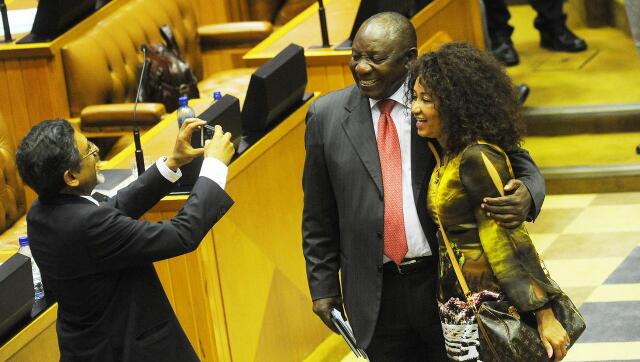In his Monday morning, “from the President’s desk” letter to South Africans, Ramaphosa said that citizens should safeguard against any and all efforts to diminish the country’s hard-won democracy.
PRESIDENT Cyril Ramaphosa’s weekly newsletter calling for greater efforts in defending South Africa’s democracy has been seen as a veiled swipe at Tourism Minister Lindiwe Sisulu, whose recent attack on the judiciary and Constitution caused a major rift among the Cabinet.
In his Monday morning, “from the President’s desk” letter to South Africans, Ramaphosa said that citizens should safeguard against any and all efforts to diminish the country’s hard-won democracy.
He called for the protection of the country’s Constitution, democratic state and electoral processes, “ whether these efforts take the form of corruption in state-owned enterprises, the subversion of our law enforcement agencies, the sabotage of our economic infrastructure, or attacks on the independence and integrity of our judiciary”.
“We need to protect our Constitution, our democratic state and the electoral process from anyone who wants to weaken our democracy and deny the South African people of their hard-won freedom,” Ramaphosa said.
His comments have been viewed as a veiled response to Sisulu, who faced widespread criticism over her controversial comments about the judiciary, Constitution and moral standing of some judges.
Ramaphosa has not yet spoken directly to Sisulu’s remarks. However, other ministers have denounced her comments.
Justice and Correctional Services Minister Ronald Lamola, Acting Chief Justice Raymond Zondo and Minister in the Presidency Mondli Gungubele have slammed Sisulu for her statements.
Political analyst Sanusha Naidu said it was “interesting” to see how early the knives were out as the ANC entered a crucial year for the party.
She said that the targeting of national key points also spoke to the notion that this could be the year of sabotage.
“A call to protect democracy is all well and good, but we must also look at the causing factors that led to this place. It is not just state capture but the internal power struggle within the ANC that led us here.
“This is do or die for all concerned parties and stakeholders, but it is South Africans who will bear the brunt. The question is: who are we protecting the institutions of democracy against? President Ramaphosa should know that we are protecting it against his own,” Naidu said.
She added that while Ramaphosa may not have directly addressed Sisulu’s ongoing attack, his remarks in his weekly newsletter was his way of responding.
“He needed to say something, and he did it in the typical Ramaphosa way,” she said.
Last week, Sisulu published an opinion piece about judges and the constitution.
On Friday, Lamola penned a response to Sisulu’s column.
Lamola slammed Sisulu’s criticism of the constitution and judiciary.
“Referring to judicial officers using crude racial tropes cannot pass off as a debate. Attacking the very institution that is (there) to uphold the constitution goes against the grain of everything that we wanted to change from before 1994,” Lamola said.
“Insinuating that judges who have assumed the high calling of judicial office in our democratic era are mentally colonised is a personal attack that cannot be condoned under any circumstances. In addition, calling any black person – whether a judge or not – a ‘house negro’, is insulting,” he added.
On Sunday, she replied in an open letter published on IOL.
“You have taken the unusual step of addressing me, a colleague, in an open letter, something unheard of in the tradition of our movement, as far as I know.
“This appears alarming since it seems to be a follow-up of the public statement issued by your department, which was all part of an equally unusual and disturbingly vicious public castigation of me since my attempt to draw public attention to one of the most fundamental issues South Africans should be discussing,” she said.
She said the constitution is a “human-made, historically contextualised document”.
Political Bureau








